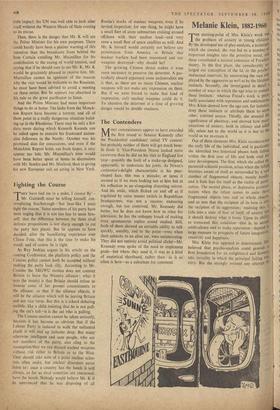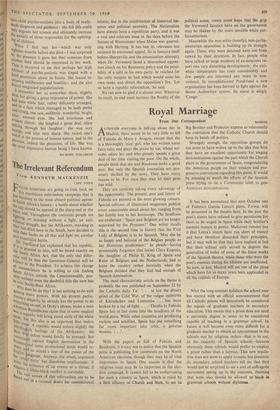Melanie Klein, 1882-1960 MHE starting-point of Mrs. Klein's work Was
I the problem of anxiety in young children. By the developed use of play-analysis, a technique I which she created, she was led to a number of important insights into the primitive mind, and these constituted a natural extension of Freudian theory. In the first place, she considerably en' larged our conception of the Id, or the psyche's instinctual reservoir, by uncovering the vast role played by the aggressive as well as by the libidinal instincts. Secondly, she investigated in detail 3 number of ways in which the ego tries to contain these instincts : whereas Freud's work is Pee°. liarly associated with repression and sublimation, Mrs. Klein showed how the ego can, for instance, deny these instincts or attribute them to - sonie other, external source. Thirdly, she stressed the significance of phantasy, and showed how mony situations of anxiety, both in infancy and adult life, relate not to the world as it is but to the world as we re-create it.
Out of these elements Mrs. Klein reconstructed the early life of the individual, and in particular she identified two historical phases both falling within the first year of life and both vital for later development. The first, which she called the paranoid-schizoid position, arises when the infal becomes aware of itself as surrounded by a vas number of fragmented objects, mostly hostile and it feels fear for itself as the victim of persc cution. The second phase, or depressive position• occurs when the infant comes to unite these fragmented objects into real or whole objects' and so sees that the recipient of its love is also the recipient of its aggression: realising this, it falls into a state of fear of itself, of anxiety lest it should destroy what it loves. Upon its abilit), to transcend this condition—that is, to accept ambivalence and to make reparation—depend l° large measure its prospects of future integration. creativity and happiness. Mrs. Klein was opposed to determinism. She believed that psycho-analysis could provide firm foundation for an enlightened and huroaol. istic morality in which the principal failing 00' envy. But she strongly resisted any attempt turn child psycho-analysis into a body of ready- Made diagnosis and guidance: she felt this could only degrade her science and ultimately increase the anxiety of those responsible for the upbring- ing of children. When I first met her—which was only eighteen months before she died—I was surprised by the pleasure it gave her that someone from another field should be interested in her work. Then it occurred to me that perhaps her high estimate of psycho-analysis was tinged with a faint pessimism about its future. She feared in- creasing g indifference and hostility : and she also teared misguided popularisation. I remember her as somewhat short, slightly ibilent, but giving a great impression of power. She had Pure white hair, rather delicately arranged, and in a face which managed to be both pretty arlti strong, one saw, suddenly, wonderful, bright, clear, amused eyes. She had enormous and evident charm : she laughed a great deal, often balking through her laughter: she was very beeinief ign, and also very sharp. She raised one's Pleasure in the powers of human nature, and in the UIe `asure, indeed the pleasures, of life. She was most impressive human being I have known.
RICHARD WOLLHEIM











































 Previous page
Previous page